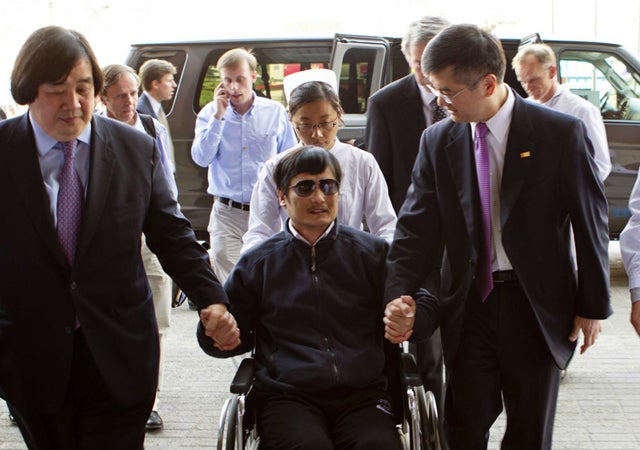A top activist for human rights in China warned on Thursday that if the United States wants to maintain its image as a global human rights leader, dissident Chen Gaungcheng and his family must join Secretary of State Hillary Clinton when she returns from China this week.
Chen has become the center of a diplomatic firestorm after he was reportedly pressured by U.S. officials to leave the American embassy in Beijing. He may now face reprisal from the Chinese government, which has also imprisoned and tortured his wife since Chen escaped confinement in his home in the Shandong province.
If the United States does not take steps to safeguard Chen and his family, warned Reggie Littlejohn of Women’s Rights Without Frontiers at an exclusive press conference at the Heritage Foundation on Thursday, it will do “tremendous damage to the United States’ reputation as a human rights defender.”
Littlejohn called on the State Department to “do whatever it takes to get asylum” for Chen, and to guarantee that he will join Clinton when she returns from her diplomatic mission to Beijing.
She also brought up a key member of China’s dissident community, known by her online alias Pearl, who Littlejohn believes is being detained and tortured by the Chinese government. “Whatever is the deal that is struck for Chen,” Littlejohn stated, “I would ask that Pearl would be a part of it.”
Bob Fu, President of China Aid and a prominent Chinese human rights activist, expressed confidence that Beijing would cooperate with American demands for asylum for Chen and his family. “If the U.S. government and President Obama have the will and determination to help do that,” Hu said, “I think the Chinese government will let them go.”
Whether that will exists is not certain. Fu echoed other reports about Chen’s departure from the U.S. embassy, saying Chen had told him he “felt pressured to leave.” American officials have disputed that, saying Chen seemed eager to return.
But according to Fu, an American official relayed threats from the Chinese government that Gaungcheng’s wife and children would be returned to Shandong, which Fu described as “hell” for the abuse in captivity they have received in there for the past seven years, if Gaungcheng did not leave the American embassy.
Hu wondered why American officials would relay the threat of returning them to their home-turned-prison if not to encourage Gaungcheng to return to Chinese soil.
Littlejohn faulted State with providing incomplete and potentially misleading information to Chen in an effort to encourage him to leave. While officials apparently relayed the threat from the Chinese government, they did not tell him that his wife was already in captivity, being physically beaten by Chinese forces.
Chen was also told that he would continue to receive physical protection while at a Chinese hospital, but “as soon as I checked into the hospital room, I noticed they were all gone,” he told CNN.
Littlejohn demanded that American official fulfill that promise until Chen is able to leave the country.
“’Accidents’ happen in Chinese hospitals,” she added.
The State Department has chosen to push other issues to the forefront in its relationship with China since Clinton was appointed secretary, relegating human rights abuses to the diplomatic sidelines. “[O]ur pressing on [human rights] can’t interfere with the global economic crisis, the global climate change crisis, and the security crisis,” Clinton said in 2009.
“The Chen affair shows just how far the Obama administration has strayed from the historic and bipartisan path of America standing up for democracy and human rights,” said Kim Holmes, Heritage’s Vice President for Foreign and Defense Policy, in response to events in China.
“If these stories are true,” Holmes added, “it looks as if the administration let its desire to have a smooth meeting with Chinese officials overshadow our nation’s commitment to human rights. It’s a sad day for freedom.”
State’s continued handling of the Chen situation will be a true test of the United States’ willingness to push for a human rights agenda in China even at the cost of rankling the regime in Beijing.
